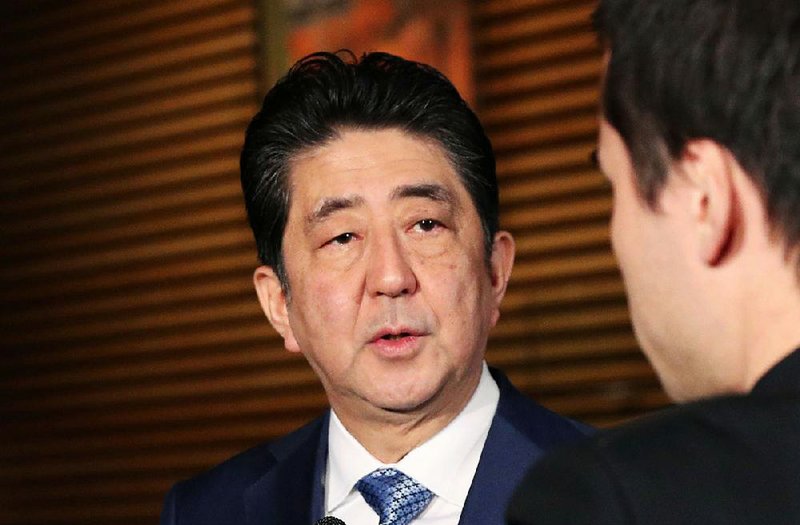TOKYO -- The summit between President Donald Trump and North Korean leader Kim Jong Un built a foundation for denuclearization on the Korean Peninsula, but the process needs to be verifiable and irreversible, Japanese Prime Minister Shinzo Abe said in a television interview Saturday.
Japan will contribute to the cost of denuclearization, but the money will go toward supporting the activities of the International Atomic Energy Agency, not directly to North Korea, Abe reiterated in the interview on Nippon TV's Wake Up! Plus morning program. He said that bearing the cost is natural because Japan feels the threat from the North's nuclear arsenal and stands to benefit from peace.
"The agreement should have included complete, verifiable and irreversible denuclearization," but in order to do that, "the deliberations take time," Abe said. "For now, a conversation has begun. Let's build trust on both sides."
The prime minister's comments built on those he made immediately after the summit Tuesday in Singapore, that the agreement to work quickly toward complete denuclearization was a "first step." Trump lauded the success of the first meeting between a sitting U.S. head of state and a North Korean leader, but a lack of detail in the leaders' statement has kindled skepticism over what he was able to accomplish.
During his post-summit news conference, Trump said Japan and South Korea as neighbors would help the North "very greatly" in paying the costs of denuclearization, while the U.S. wouldn't need to contribute financially. Asked for details the next day, Japanese Chief Cabinet Secretary Yoshihide Suga said at a news conference in Tokyo that the government would provide financial support for International Atomic Energy Agency inspections.
In Saturday's TV interview, Abe also said Japan will not provide economic assistance to North Korea until the abduction issue is solved. Abe has said he thanked Trump for raising the topic in his meeting with Kim, although it wasn't included in the statement.
Abe has made the return of abductees a key political issue. Tokyo officially lists 17 of its citizens as having been kidnapped by North Korea in the late 1970s and early 1980s, five of whom returned home in 2002. As of April 2017, more than 12 million people had signed petitions from the families urging Abe to continue efforts to return the rest of them.
Another subject that was not mentioned in the statement -- along with the regime's human-rights abuses, its exports of missile technology and its mistreatment of U.S. prisoners -- was North Korea's long record of cyberattacks against sensitive targets in the U.S. and allied nations.
Experts warn that the country's hacking skills have become increasingly sophisticated and dangerous in recent years. North Korean exploits have included the damaging 2017 WannaCry ransomware attacks, intrusions into banks in more than a dozen countries to heist millions of dollars over the past few years, and continual cyberattacks on South Korean computer networks.
In the run-up to the Singapore meeting, the U.S. Department of Homeland Security warned of an ongoing threat by North Korean government hackers, who have attacked critical infrastructure and media, aerospace and financial companies since at least 2009, infecting networks in at least 18 countries, including the United States. Days after the summit, the department sent a fresh notice describing malware variants used by North Korea.
[NUCLEAR NORTH KOREA: Maps, data on country’s nuclear program]
But there is no indication that the two leaders discussed cybersecurity, worrying experts who warn that North Korea's cyberwarfare capabilities pose an immediate threat to U.S. interests that warrants high-level attention.
Few know the impact of a North Korean cyberattack like former Sony Pictures CEO Michael Lynton. More than three years ago, the American movie studio owned by Sony suffered a crippling hack before its release of The Interview, a film centered on a screwball satire of Kim.
The unprecedented corporate cyberattack cost Sony more than $100 million -- destroying more than 70 percent of the computers at the then-7,000-person studio, Lynton told The Associated Press in an interview Wednesday. It took the company roughly a year to recover. Lynton left Sony in 2017 to become chairman of Snap Inc.
"Denuclearization is great, but we also have to concern ourselves with what the cybercapabilities are, so we can make sure that doesn't happen to our businesses and other assets in the United States," Lynton said.
The Associated Press made efforts to determine whether the subject came up in Singapore, but the White House declined official comment. The subject wasn't mentioned in official statements out of the summit or by the president in his post-summit news conference.
Dmitri Alperovitch, co-founder of cybersecurity firm CrowdStrike Inc., said North Korea's recent cyberactivities have focused on "traditional espionage" aimed at gathering intelligence from nations involved in the summit, as well as destructive attacks and cybercrime to raise money for the regime.
North Korea has slowly joined the small group of nations, along with China and Russia, with both the hacking ability and a proven willingness to attack U.S. interests. After the attack on Sony, the FBI publicly blamed North Korea, the first time it had done so. President Barack Obama's administration imposed sanctions as a result.
An Obama-era agreement with China aimed at curbing economic cyberespionage was reaffirmed by the Trump administration last year. But earlier this year, Trump accused China of continuing to conduct and support cyberintrusions into U.S. computer networks "to gain access to valuable business information so Chinese companies can copy products," costing the economy "hundreds of billions of dollars" annually.
Homeland security officials have carried on with their cybersecurity mission outside the main focus of the Trump-related political sphere, often out of public view. But the results of that China-U.S. pact have left many a little jaded about the efficacy of diplomacy on that issue.
Information for this article was contributed by Kevin Buckland and Emi Urabe of Bloomberg News and by Tami Abdollah of The Associated Press.
A Section on 06/17/2018

